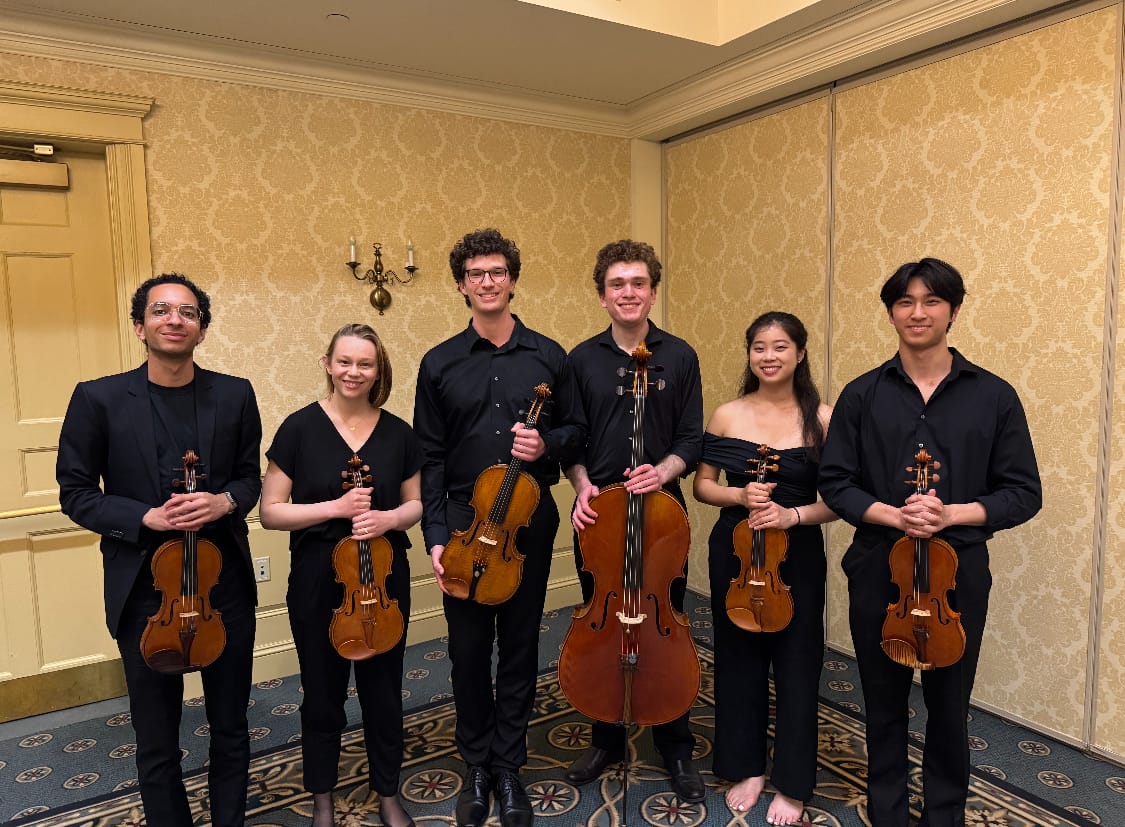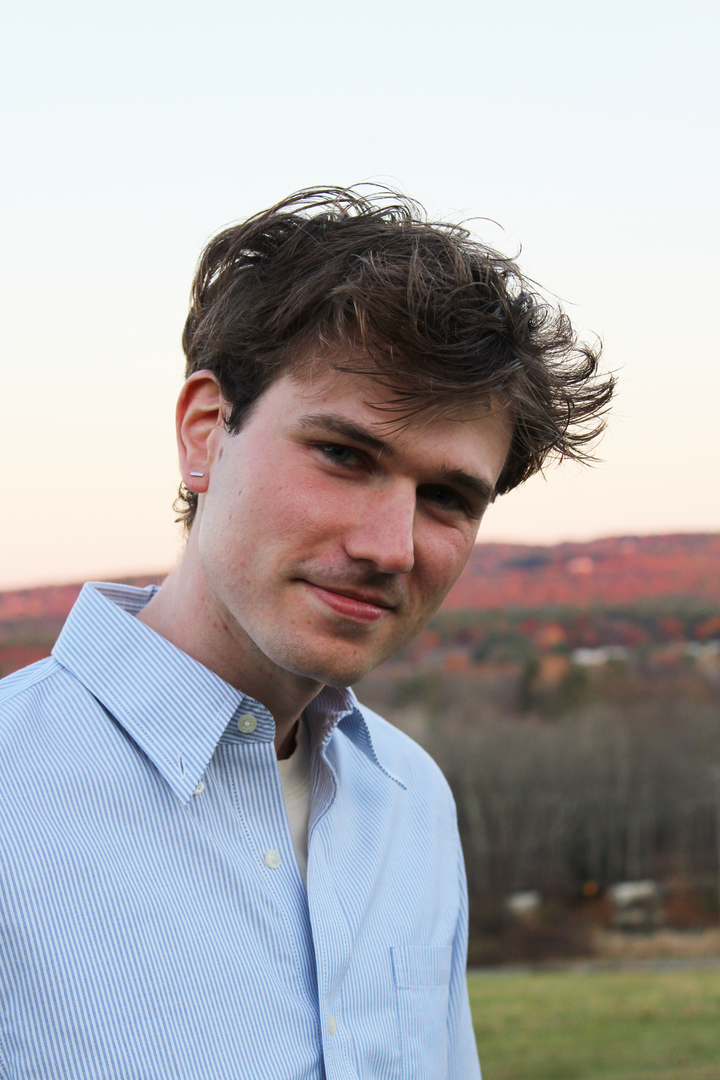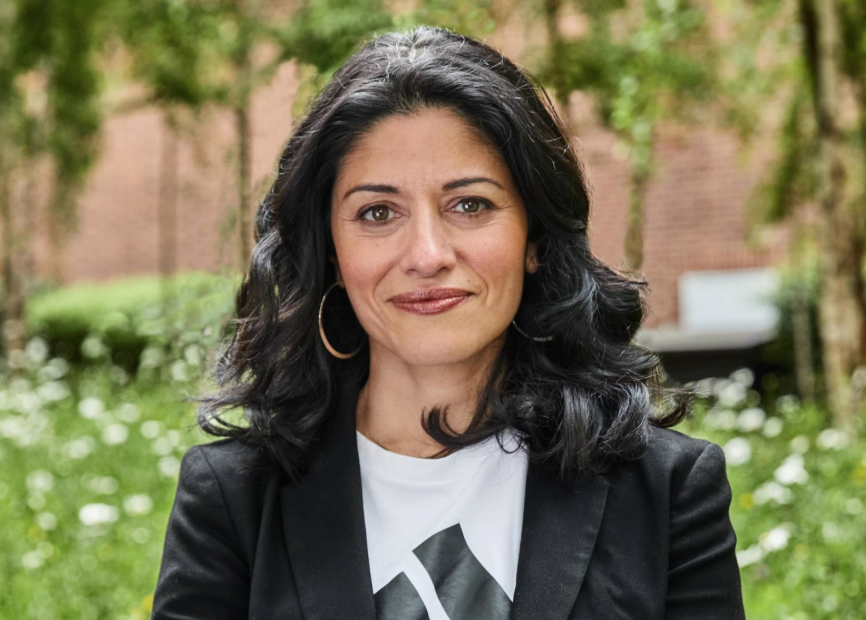Oren Tirschwell: Cultivating Community through Cello, Calculation, and Collaboration
Whether it’s his interdisciplinary research on gun violence, his incredible cello performances, or even his efforts in bringing Tandem Bagels back to Val, Oren Tirschwell’s presence has been invaluable in improving Amherst’s community.

Oren Tirschwell ’25’s kindheartedness, talent, and persistence characterize his invaluable impact on so many individuals at Amherst and on the college as a whole. Even a brief interaction will reveal Tirschwell’s unique ability to identify a problem, take initiative to enact a solution alongside community, and persevere when challenges arise — leading with generosity every step of the way. Tirschwell solidified his identity on campus as a dedicated problem-solver actively working to make Amherst a better place, and reflecting on four years of this devotion, it is safe to say that he has succeeded in creating a more engaged, empowered, music-filled campus — a legacy that will ripple indefinitely.
Tirschwell’s cadence to his final month at Amherst has been noted by multiple masterful cello performances across campus and in town as well as multiple presentations of his robust thesis research on gun violence; his campus celebrity status is certainly well-earned. Despite copious student-facing appearances, Tirschwell’s radiating sincerity and reliable commitment to the people around him is an example for all.
Statistically Speaking
For Tirschwell, math sums up the language of problem-solving — a quest motivating him in and out of the classroom. His love of math stems from a young age: He recalled the day that, in first grade, Tirschwell was told that the school math specialist could multiply any two numbers together. “I chose the two biggest numbers that I could come up with — which I believe was 99 and 99 — and I was just in total awe when he managed to do it. I think curiosity and fascination with how to do tangible and interesting and applicable things that actually mean something has stuck with me,” Tirschwell said.
Though this math specialist was one of the first adults to foster his curiosity in numbers, Tirschwell credits many teachers along the way for nurturing this quantitative spark. In middle school, Tirschwell’s path in statistics was unmistakable to his math teacher, even if Tirschwell himself couldn’t see it yet.
“He really thought I should take a statistics class before I graduated high school, and I didn't. Sorry, Mr. Bobeth,” Tirschwell said. “But he was totally right, and that ended up being exactly what I loved.”
Later, through the “passionate love” for math displayed by Ms. Kaplan — Tirschwell’s 10th and 12th grade math teacher — Tirschwell learned two essential things: the value of digging deeper through asking more questions, and gaining comfort in not being a perfectionist.
“I actually think that latter point has guided a lot of my thought process in college, where I have always believed that the most effective way to learn math is to be thrown at a bunch of really, really challenging problems and to do your best,” he said.
After graduating high school in 2020, Tirschwell spent a gap year working in data science internships, mostly from a coding perspective. Problem-solving via coding has long been a way for Tirschwell to connect with and help others, something he even wrote about in his Common Application essay. Upon starting at Amherst, with a solidified interest in mathematical applications, Tirschwell found the statistics department to be the best way to not only problem-solve, but also to connect with others.
While his first interactions with now-close friend Megan Huang ’25 initially consisted of “running into each other and standing in the hall awkwardly for long durations of time,” it was through their shared love of coding that their friendship blossomed. “I made him help me debug code for a class, which won him some brownie points,” she recalled.
Rather than majoring in statistics though, Tirschwell wanted to further explore how statistical applications implicated issues he cares about. He ended up creating his own interdisciplinary major, “Applications of Data Science to Public Policy,” developed out of the statistics major and elements of math, computer science, and political science.
The major echoes Tirschwell’s belief that statistics is a “tool to solve bigger problems.” Statistics has never just been about the numbers for Tirschwell — it’s about the question, “How do we combine these tools to do something meaningful and beneficial and impactful in the world?”
In 2022, Tirschwell was profiled by The Student for his use of data science to build a Covid-tracking platform after the college announced it would no longer send out regular pandemic updates. Tirschwell described this as “one of the first public-facing problems [he] attempted to address at Amherst.”
This spring, Tirschwell submitted his interdisciplinary thesis, “A Fatal Fallacy: The Gap Between Empirical Research and Public Opinion on Safety Implications of a Firearm in the Home.” It explores the logical inconsistency in the fact that, despite decades of research proving empirically that having a firearm in the house makes people less safe, the American public continues to believe otherwise — that guns beget safety. Tirschwell’s thesis comes down to a question of framing and crafting persuasive arguments that speak more directly to people.
“[Tirschwell] was committed from the start to make a change in the world and apply his technical expertise to that end,” Tirschwell’s primary major and thesis advisor, Lecturer in Statistics Pamela Matheson, said. “If he hadn't started [researching] two years ago, it would have never been possible.”
His thesis was featured in The Student’s Thoughts on Theses column, in addition to being one of ten senior theses to compete in the 3-Minute-Thesis competition, at which his research won the People’s Choice Award.
Tirschwell expressed much appreciation to all his professors who supported him in this process.
“I have been tremendously grateful to so many Amherst professors. The amount of support that I’ve gotten from people has been remarkable and profound,” Tirschwell said.
Orchestrating Community
As a community-driven extrovert, Tirschwell has expanded beyond math as a tool to connect with others. Of the many hats Tirschwell wears on campus, perhaps the most prominent is his role as principal cellist in the Amherst Symphony Orchestra. This fall, having spent more time weekly practicing cello than doing coursework, Tirschwell says it was primarily the people who sustained his investment: “People that I just really love spending time with and really love playing music with, who want to play music together, and who can create something that’s able to communicate thought, feeling, emotion, depth, to others in a way that’s really special.”
Tirschwell’s cello journey began 15 years ago at age seven-and-a-half, but at the age of three he was already playing piano. His mom, a pianist, insisted that music be part of his education, even though there was a point when he wanted to quit.
“I will be eternally grateful for her for that, and I don’t know what my college experience would have looked like without music ... I’m very, very grateful that she got me to stick with it,” Tirschwell said.
He echoed his gratitude for her at his senior recital, which happened to be on Mother’s Day. The recital culminated in a full-circle emotional finale: His melodious cello was accompanied by his mother on the piano.
With a deep passion for music and a desire to expand its accessibility, Tirschwell believes that music at Amherst has a place for all to enjoy outside of the Arms Music Center. This semester, Tirschwell launched the Amherst College Artists Connections (ACAC) outreach initiative — a group of 10 passionate students dedicated to bringing chamber music to the broader community. With Tirschwell’s coordination, the Center for Community Engagement and the music department have already brought chamber music around campus and into town — spreading the love of music to everyone from the children at the Jones Library to the retired community at the senior center.
“He is a fantastic musician. He has somehow deflected all the comments from music professors telling him he should really be a music major. I am so proud of him for his incredible performances and know that countless hours are put into each performance,” Huang said. “Oren even brought his cello on our small vacation getaway with friends — unfailingly, he serenaded us every morning. I am happy to hear that Oren will keep music in his busy life after college.”
When asked if there was a piece of music that captured his experience at Amherst, Tirschwell had a fitting answer prepared: Dvořák's Piano Quartet No. 2 in E-flat major — a composition also included in his senior recital.
“I think it does a fairly good job of encapsulating my time at Amherst. It contains a very wide range of emotions, and I think my experience, like many, [has had many] up[s] and down[s]. And there have been some really wonderful moments, and there have been a lot of really not wonderful moments,” Tirschwell said.

From Bagels to Washing Machines
Tirschwell’s experience has included targeted efforts to improve Amherst for the greater good. Anyone that has enjoyed a freshly baked Tandem bagel on a weekend morning this year has Tirschwell to thank.
“[Tandem Bagels] has become, perhaps to an extent, synonymous with my identity on campus,” Tirschwell said.
While the cumulative 600 signatures on two separate successful petitions spearheaded by Tirschwell to rally for the return of Tandem Bagels to Valentine Dining Hall are well-known, Tirschwell has also circulated petitions to change a number of other things around campus, including fixing broken washing machines and postponing the vote on the honor code.
“These [petitions] have all been … things where there has been a clear identifiable problem that I have felt could be solved and maybe just hadn’t been raised in the right way,” Tirschwell said. “It was like everyone was so upset about it, but no one, at least a year and a half ago, was doing anything about it. And so I was just like, ‘Why don't I do something about it?’”
Thinking on his relationship to change-making, Tirschwell pinpointed an op-ed he wrote in 10th grade explaining why he sat for the twice-a-year Pledge of Allegiance. The article led to private conversations with administrators, which ultimately influenced the administration’s decision to remove the Pledge from assemblies.
“I think that helped me realize that whether subconsciously or consciously, the voices of students who take the time to write careful and thoughtful work can, and will, be heard by senior administration, and … has the potential to make change.”
This approach has guided Tirschwell’s engagement on campus. From organizing numerous Jewish life events, to being involved in seemingly every music initiative, to advocating for bagels, and a successful 15 months of persistent insistence on fixing the washing machines in Lee Residence Hall — Tirschwell’s involved dedication has contributed so much to the Amherst community, forming a legacy that will far outlast his four years here.
Thinking Back and Looking Forward
Tirschwell attributes his proposals’ successes to the relationships he’s built with administrators and other students. He believes that “being respectful and working together” is key to creating meaningful community change.
Tirschwell recalled the time that he brought a loaf of challah to a senior administrator who he knew was Jewish on a Friday afternoon — just because — and they ended up chatting for half an hour. This is very in character for Tirschwell.
“Having solid relationships, and building those connections outside of just the contexts in which you're trying to solve problems, has been a really important thing for me,” Tirschwell said. “If you're coming after an administrator with a lot of anger — if they aren’t able to see your humanity, and if you aren't able to see their humanity — it’s really hard to be able to speak across a potential divide in your viewpoints.”
Following all that he’s learned both in and out of the classroom during his time at Amherst, Tirschwell has a summer of traveling and, uncharacteristically, relaxing in store.
His friends and mentors wish him much-deserved rest after graduation. “Although Oren’s vocabulary does not comprise the words ‘rest’ or ‘break,’ I hope he can take time for himself and enjoy simply existing,” Huang said.
“I hope he is able to practice not opening a book, or the cello case, for several days in a row every now and again, so that he can relax and see the rest of what the world has to offer,” Matheson said.
Tirschwell will be working at the University of Chicago Crime and Education lab in the fall — a data science research nonprofit focused on three of his intersecting research interests: educational inequality, criminal justice reform, and gun violence. Because he will be beginning at the Crime Lab’s New York office, he intends to find his way in the lively semi-professional classical music scene there.
"I definitely have every intention of keeping the cello in my life for a very long time,” Tirschwell said.
Cheering him on his next adventures, many students and faculty certainly will miss Tirschwell on campus. While his time at Amherst is coming to a close, Tirschwell’s commitment to Tandem Bagels at the college will outlast commencement. He said if Valentine Dining Hall attempts to replace the bagels again in the future, he hopes some student will reach out to him and seek his advice on bringing them back. Beyond just the bagels, though, Tirschwell’s mission has been to change Amherst for the better, and there is no doubt that Tirschwell has succeeded on this mission.





Comments ()